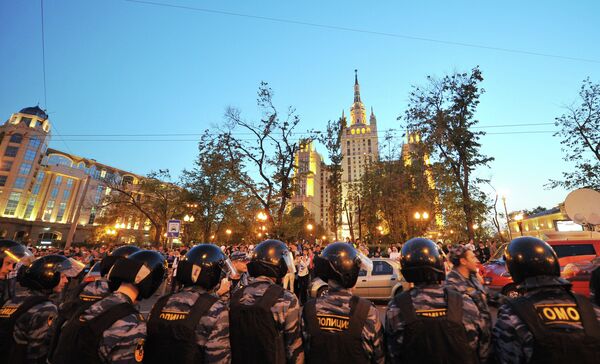The Kremlin is unlikely to mount a full-scale violent crackdown on the resilient opposition like in Belarus despite mounting tensions in Moscow between protesters and police, Russian political analysts said.
“I don’t see a future for a repressive approach,” Mikhail Vinogradov, chairman of the St. Petersburg Politics Fund, said on Friday.
The past weeks have been marked by clashes between opponents of President Vladimir Putin and Moscow police, starting with riots during an opposition rally on May 6, which resulted in 30 police officers injured and some 650 protesters briefly arrested, according to rights activists.
Police hunted peaceful protesters in downtown Moscow in the following days, detaining people on sight for wearing white ribbons, a symbol of the protests.
Opposition leaders Alexei Navalny and Sergei Udaltsov were jailed for 15 days following the protests, prompting Amnesty International, a global rights watchdog, to recognize them as "prisoners of conscience."
However, protesters managed to set up a camp in the city’s center on May 9 and hold a mass rally to uphold freedom of assembly last Sunday.
Still, authorities continued to pressure the activists, not cracking down on the camp outright, but forcing it to relocate and detaining dozens, including environmental champion Yevgenia Chirikova, on various pretexts.
“But this is only surgical repressions so far,” said independent political analyst Stanislav Belkovsky.
The Lukashenko Option
Protests in Moscow have been ongoing since December, attracting tens of thousands, but were peaceful before. Analysts say the creeping radicalization was induced by Putin refusing to enter into full-scale dialogue with the opposition.
The situation in Russia resembles the standoff in Belarus, where authoritarian President Alexander Lukashenko, in power since 1994, cracked down on his opponents after winning the widely questioned elections in 2010.
Several Belarusian opposition leaders were jailed, and authorities struggled to ban any form of street protests, dispersing people even for gathering outdoors and clapping their hands in silence.
Putin, who was inaugurated on May 7, chose Minsk as the destination for his first foreign visit instead of a visit to a G8 summit in Camp David. The move prompted speculation that he was sending a message about his political priorities.
Putin has not spoken on the recent protests, but his spokesman Dmitry Peskov said shortly after the May 6 protests that “protesters should have had their livers smeared on the sidewalk for injuring riot police."
Peskov also said that the opposition puts forth some legitimate demands concerning political liberalization, but that the scale of protests should not be overestimated and that the opposition camp in Moscow will be dispersed, which was still to happen as of Friday evening.
Interior Troops & How to Use Them
The Russian government has the technical means to suppress dissent, with 200,000 Interior Ministry troops at its disposal specifically trained to crack down on street protests, said security analyst Andrei Soldatov, editor-in-chief of Agentura.ru website.
Unlike regular police, which work with the populace and are more susceptible to public moods, the Interior Ministry troops are a quasi-army formation, isolated from the public in their barracks and therefore less prone to doubt or question orders, Soldatov said.
“They feel like the whole world is against them. They [mentally] separate themselves from the environment they work in, which makes a crackdown easier,” he said.
However, having the troops at the ready is not the same as actually utilizing them, political analysts said.
Putin is not a full-fledged authoritarian leader like Lukashenko, relying heavily on the wavering elites, while the Russian law enforcement employees are much more corrupt and less prone to take responsibility for drastic actions than their Belarusian counterparts, Belkovsky said.
“The Lukashenko scenario is ruled out in Russia,” said Belkovsky.
Dialogue Imminent
Both Belkovsky and Vinogradov said that the Kremlin will be eventually forced to negotiate with the protesters, despite Putin’s obvious reluctance to do so.
“Repressions only work then the populace stops being scared, and the government needs to put the fear of God into them,” said Vinogradov. “But in this situation, attempts to intimidate protesters only radicalize them.”
“It goes back and forth” from conflict to dialogue, Belkovsky said about the relations between the government and the protesters.
He predicted that political reforms launched after the protests in December but then crippled by the Kremlin will continue, as will the opposition’s pressure at regional elections where pro-Putin candidates faced a string of setbacks in recent months.



